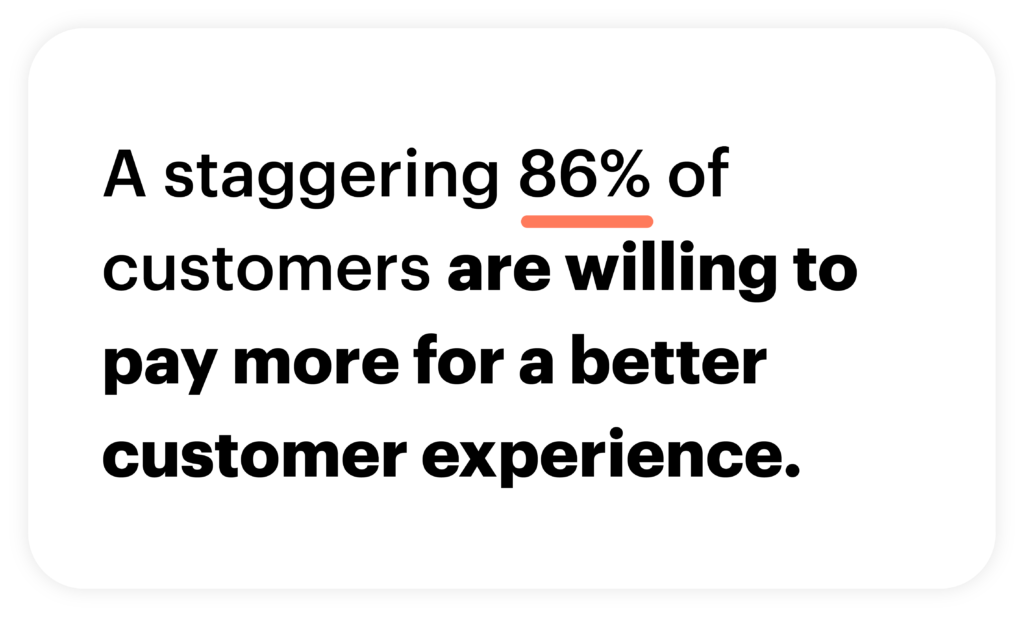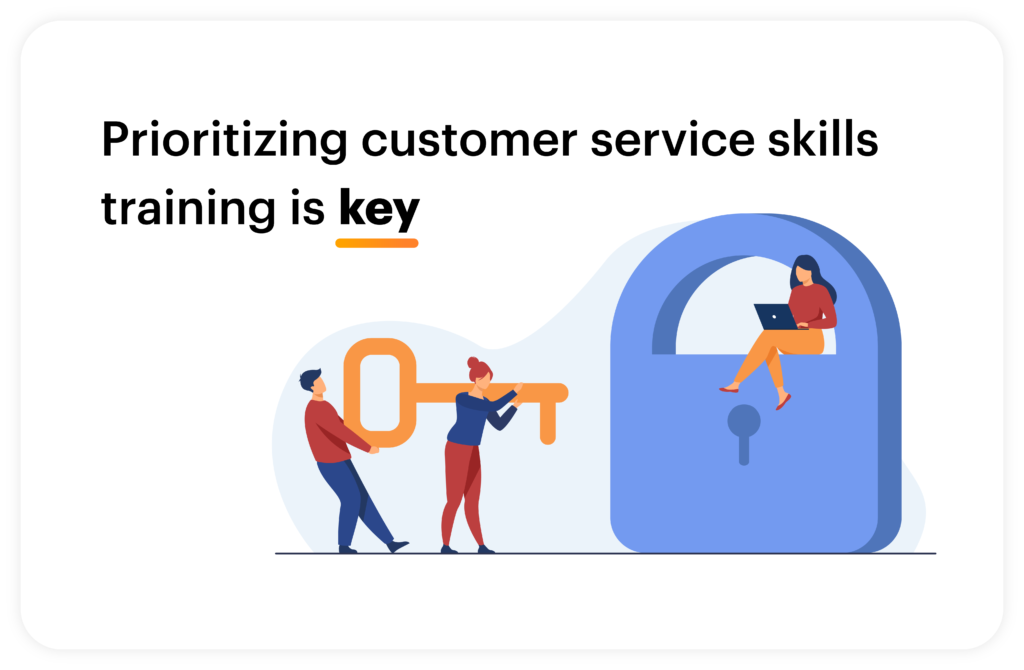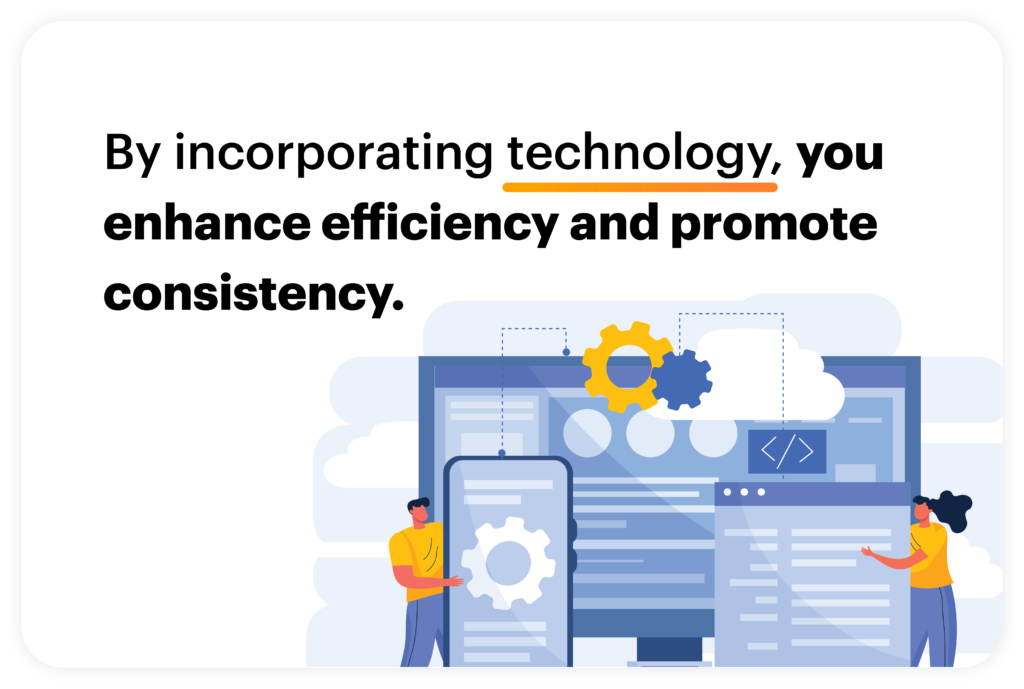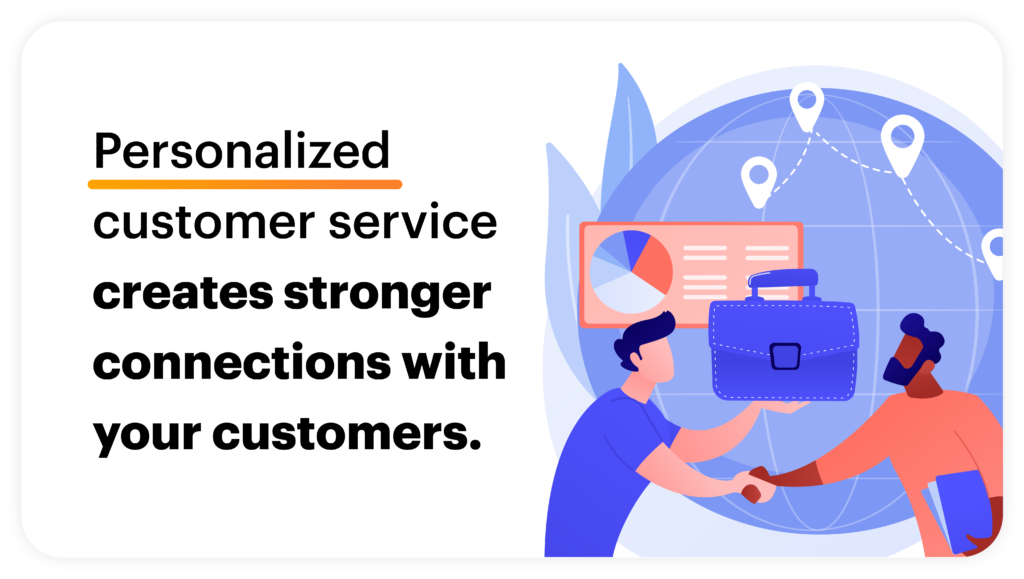In today’s competitive business landscape, delivering consistent customer service has become more critical than ever, particularly for B2B enterprise support teams. As seasoned support professionals, you know the importance of meeting customers’ expectations and providing a high level of service every time they reach out. This article aims to equip you with new insights, less-discussed topics, and valuable strategies that are specifically relevant to B2B customer support teams and organizations. Through a deep understanding of customer service principles, examples, and best practices, you’ll be empowered to elevate your team’s performance and make a lasting impact on your client’s satisfaction.

1. Set Clear Expectations
A strong foundation for delivering consistent customer service begins with setting and communicating clear expectations to both your customers and your support team. By establishing well-defined expectations, you can ensure that everyone is on the same page and working towards the same goals, thereby contributing to a more consistent customer experience.
The Importance of Setting and Communicating Service Expectations:
Having clear expectations in place helps avoid confusion and misunderstandings between your support team and customers. When customers know what to expect from your company’s support team, they are more likely to feel confident in the service they receive and maintain a positive perception of your brand.
Setting expectations enables your support engineers and representatives to perform their duties effectively, as they have a clear understanding of their responsibilities and what is expected of them in terms of customer service. This clarity empowers your team members to consistently meet and exceed the expectations set for them, ultimately driving customer satisfaction and loyalty.
How Clear Expectations Lead to Consistent Customer Experiences:
When expectations are well-defined, support team members are better equipped to maintain consistency in their interactions with customers. This means that regardless of who the customer is interacting with, they will receive a similar level of service and support from your company.
For example, if your enterprise customer support team has a set response time window for replying to customer inquiries, it ensures that all customers receive timely assistance, regardless of which support engineer handles their case. This consistency in service builds trust and fosters positive relationships with your customers, as they know they can rely on your support team to deliver on their promises.
In conclusion, setting clear expectations for your customer support team is a critical aspect of delivering consistent customer service. By outlining what is expected of both your support team and customers, you create an environment where everyone understands their role in the customer support process and works together to provide exceptional experiences.
2. Prioritize Customer Service Skills Training
In the fast-paced world of enterprise customer support, it’s essential to continually invest in your support engineers’ skills and abilities. By prioritizing customer service skills training, you can ensure that your team members are equipped to deliver consistent and high-quality support to your customers, fostering positive relationships and driving customer satisfaction.

Emphasize the Value of Continuous Training for Support Engineers:
Ongoing training is critical to keep your support engineers updated with the latest industry best practices, technologies, and strategies. By providing regular training opportunities, you empower your team to stay current and continuously improve their customer service skills. This, in turn, ensures that your customers receive consistently exceptional support, regardless of who they interact with.
Continuous training also helps to maintain employee motivation and job satisfaction. As your support engineers develop new skills and expand their knowledge, they are more likely to feel valued and engaged, leading to lower turnover rates and a more experienced, consistent support team.
Essential Customer Service Skills to Be Developed:
Here are some essential customer service skills that your support engineers should develop to ensure consistently outstanding support:
- – Active Listening: The ability to actively listen and understand customers’ needs is crucial for providing effective solutions and fostering positive customer experiences. (Hyperlink back to our article here: https://www.supportbench.com/what-are-the-benefits-of-active-listening/ )
- – Empathy: Developing empathy enables your support engineers to understand and relate to customers’ emotions, resulting in more compassionate and understanding support.
- – Problem-Solving: A strong problem-solving mindset is critical for resolving complex customer issues and providing efficient support.
- – Adaptability: Support engineers should be adaptable, able to adjust to different customers and situations while maintaining a consistent level of service.
- – Communication: Clear and effective communication is essential for conveying information to customers and resolving issues quickly and efficiently.
- – Technical Knowledge: Support engineers should be well-versed in the technology and tools they use to provide timely and accurate assistance to customers.
Prioritizing customer service skills training is key to ensuring your support engineers are prepared to consistently deliver outstanding support. By focusing on developing essential customer service skills and providing ongoing training opportunities, you can create a support team that excels in meeting and exceeding customers’ expectations.
3. Implement Customer Feedback Loops
To maintain and continuously improve the quality of your customer service, it’s essential to actively seek and utilize customer feedback. Implementing customer feedback loops allows you to identify areas where your service may be lacking and make data-driven decisions to enhance the consistency and quality of your support. In this section, we’ll explore the role of customer feedback in ensuring consistent service quality and discuss methods for collecting and analyzing feedback.
The Role of Customer Feedback in Maintaining Consistent Service Quality:
Customer feedback is a powerful tool for identifying what your support team is doing well and areas where improvements can be made. By analyzing the feedback, you can pinpoint patterns and trends that may indicate a need for changes in your support processes or additional training for your team. This continuous improvement cycle allows you to maintain consistently high-quality customer service and adapt to evolving customer needs.
Actively seeking feedback from customers demonstrates that you value their opinions and are committed to meeting their expectations. This helps build trust and loyalty, leading to stronger long-term customer relationships.
Methods for Collecting and Analyzing Feedback:
There are various methods to collect and analyze customer feedback to ensure consistent service quality:
- – Surveys: Post-interaction surveys and periodic customer satisfaction surveys can help you gauge customer perceptions of your support quality and identify specific areas for improvement.
- – Net Promoter Score (NPS): NPS is a metric that measures customers’ likelihood to recommend your business to others. It can provide valuable insights into your overall service quality and identify trends that may impact customer loyalty.
- – Social Media Monitoring: Keep an eye on social media platforms where your customers may discuss their experiences with your support team. This can help you identify areas for improvement and address any concerns promptly.
- – Direct Feedback: Encourage customers to provide direct feedback through support channels, such as email or live chat, to gain insights into their experiences with your team.
Once you’ve collected feedback through these channels, it’s essential to analyze the data and identify patterns or trends that may indicate areas for improvement. Use this information to make data-driven decisions, implement changes in your support processes, and continuously train your team to enhance their skills and knowledge.
Implementing customer feedback loops is crucial for maintaining consistent service quality in enterprise customer support. By actively seeking and analyzing feedback, you can make informed decisions to improve your support processes and ensure that your team consistently meets and exceeds customers’ expectations.
4. Utilize Technology and Tools for Efficiency
In today’s business environment, leveraging technology and tools can significantly enhance your enterprise customer support team’s efficiency and consistency. By implementing the right tools, you can streamline processes, reduce response times, and ensure your support engineers have the resources they need to deliver exceptional customer service.

Benefits of Using Technology to Enhance Customer Support:
- – Improved efficiency: Technology can help automate routine tasks, allowing your support engineers to focus on resolving complex customer issues.
- – Consistency in service: Tools that standardize processes and provide support engineers with easy access to resources can promote consistency in the quality of customer interactions.
- – Faster response times: By utilizing technology to prioritize and route customer inquiries, you can significantly reduce wait times and ensure customers receive prompt assistance.
- – Data-driven decision-making: Analytics and reporting tools can provide valuable insights into your support team’s performance and help identify areas for improvement.
- – Scalability: As your business grows, technology can help support the expanding needs of your customer base and ensure consistent service quality.
Examples of Tools for Consistency in Customer Support:
- – Helpdesk software: Implementing a robust helpdesk solution can centralize customer interactions, track requests, and automate routine tasks to ensure consistency across your support team.
- – Knowledge base: Developing a comprehensive knowledge base can provide support engineers with instant access to relevant information, enabling them to deliver accurate and consistent responses to customers.
- – Customer relationship management (CRM) system: Integrating a CRM system with your support tools can ensure seamless data sharing and streamline workflows, resulting in a more consistent customer experience.
- – Live chat and chatbots: Live chat enables real-time communication with customers, while chatbots can handle basic inquiries, improving response times and promoting consistent support quality.
- – Analytics and reporting tools: Leveraging data analysis tools can help you monitor and optimize your support team’s performance, ensuring continuous improvement in service quality.
By incorporating technology and tools into your enterprise customer support strategy, you can enhance efficiency, promote consistency, and ensure your support engineers have the resources they need to provide exceptional service. Carefully evaluate your team’s requirements and invest in tools that align with your goals and objectives to drive improvements in customer satisfaction and overall support quality.
5. Implement a Knowledge Base and KCS Methodologies
A well-maintained knowledge base is an essential component of a high-performing enterprise customer support team. It serves as a centralized repository of information that your support engineers can access to quickly and effectively resolve customer issues. In this section, we’ll discuss the advantages of a well-maintained knowledge base and how the implementation of Knowledge-Centered Service (KCS) methodologies can lead to faster and more consistent issue resolution.
Advantages of a Well-Maintained Knowledge Base:
- – Increased efficiency: A comprehensive knowledge base enables support engineers to access relevant information quickly, reducing the time spent searching for answers and increasing the overall efficiency of your team.
- – Consistent service quality: By providing a single source of truth, a knowledge base ensures that support engineers are delivering accurate and consistent responses to customer inquiries.
- – Empowered customers: A public-facing knowledge base allows customers to find answers to their questions independently, reducing the volume of support requests and increasing customer satisfaction.
- – Continuous improvement: A well-maintained knowledge base can be regularly updated and expanded based on customer feedback, ensuring that your support team has access to the most up-to-date information.
Implementing KCS Methodologies for Faster and More Consistent Issue Resolution:
Knowledge-Centered Service (KCS) is a set of best practices and methodologies designed to optimize the use of a knowledge base in a customer support setting. By implementing KCS, you can further enhance the benefits of a knowledge base and promote more consistent issue resolution. Key aspects of KCS include:
- – Creating content as a byproduct of problem-solving: Encourage your support engineers to document solutions and insights they discover while resolving customer issues. This practice helps keep your knowledge base current and relevant.
- – Evolving content based on demand: Regularly review and update the most frequently accessed content in your knowledge base to ensure that it remains accurate and up-to-date.
- – Leveraging collective knowledge: Encourage collaboration and knowledge sharing among support engineers, fostering a culture of continuous learning and improvement.
- – Measuring the effectiveness of the knowledge base: Use analytics and reporting tools to monitor how well your knowledge base is serving both customers and support engineers. Use this data to inform updates and improvements to the knowledge base.
Implementing a knowledge base and KCS methodologies can significantly improve the efficiency and consistency of your enterprise customer support team. By providing easy access to relevant information and fostering a culture of continuous learning and improvement, you can ensure that your support engineers consistently deliver high-quality service to your customers.
6. Establish Personalized Customer Service
Personalizing customer interactions is a crucial aspect of delivering consistent and exceptional customer service. Customers appreciate support teams that can address their needs on a personal level, resulting in higher satisfaction and loyalty

The Importance of Personalized Customer Service:
- – Builds trust and rapport: Personalized customer service fosters trust and rapport between support engineers and customers, paving the way for productive and effective problem-solving.
- – Enhances customer experience: Customers who feel valued and understood are more likely to have a positive experience with your company, increasing their likelihood of recommending your services and becoming long-term customers.
- – Differentiates your business: By offering personalized customer service, you can differentiate your business from competitors and create a unique value proposition that sets you apart in the market.
Strategies for Achieving Personalized Customer Service in a B2B Setting:
- – Collect and use customer data: Gather relevant information about your customers, such as industry, company size, and specific pain points, and use this data to tailor your support approach to their unique needs.
- – Train support engineers on soft skills: Ensure that your support engineers are well-versed in empathy, active listening, and effective communication, enabling them to better connect with customers and understand their needs.
- – Segment customer support: Organize your support team into specialized groups based on factors like customer industry, product usage, or customer tier. This enables your team to provide more targeted and knowledgeable support for each customer segment.
- – Personalize communication: Use your customers’ names and reference past interactions or known preferences in your communications, demonstrating that you remember and value their relationship with your company.
- – Be proactive: Anticipate potential customer needs and reach out to them with personalized solutions before issues arise. This shows customers that you care about their success and are committed to providing excellent service.
By establishing personalized customer service as a priority, you can create stronger connections with your customers and consistently deliver high-quality, tailored support. This not only improves customer satisfaction but also contributes to the overall success and growth of your B2B enterprise.
7. Develop a Strong Company Culture
A strong company culture plays a significant role in fostering consistent and exceptional customer service. When employees feel valued, engaged, and motivated by a shared mission, they are more likely to deliver top-notch support to their customers.
The Role of Company Culture in Fostering Consistent Customer Service:
- – Aligns employees with company values: A well-defined company culture communicates your organization’s core values, helping employees understand what is expected of them and how to prioritize customer satisfaction.
- – Encourages employee engagement: A positive work environment promotes employee engagement, which in turn leads to higher motivation, better performance, and increased customer satisfaction.
- – Fosters teamwork and collaboration: A healthy company culture encourages teamwork, enabling your support engineers to collaborate effectively and provide more comprehensive and consistent support to your customers.
Tips for Creating a Culture That Prioritizes Customer Satisfaction:
- – Define and communicate your company values: Clearly outline your organization’s values, ensuring that they emphasize customer satisfaction, and communicate these values to your employees regularly.
- – Offer continuous training and development: Invest in employee training and development to promote a growth mindset and empower your team to constantly improve their skills and knowledge.
- -Recognize and reward exceptional service: Acknowledge and reward employees who consistently deliver excellent customer service, reinforcing the importance of customer satisfaction within your company.
- – Encourage open communication and feedback: Foster an environment where employees feel comfortable sharing their ideas, concerns, and feedback, helping to identify areas for improvement and promote a sense of ownership in customer service outcomes.
- – Lead by example: Demonstrate your commitment to customer satisfaction through your own actions, setting a positive example for employees to follow.
By developing a strong company culture that prioritizes customer satisfaction, you can create a cohesive and motivated team capable of delivering consistent, high-quality customer service. This not only enhances the customer experience but also contributes to the long-term success of your B2B enterprise.
8. Monitor and Analyze Key Performance Metrics
Understanding and tracking key performance metrics are essential for maintaining consistency in customer service. By analyzing customer service KPIs, support teams can identify areas for improvement, gauge their performance, and ensure they are consistently meeting customer expectations. In this section, we’ll discuss the importance of tracking customer service KPIs and explain how monitoring KPIs can help maintain consistency.

The Importance of Tracking Customer Service KPIs:
- – Identifies strengths and weaknesses: Monitoring KPIs allows your support team to pinpoint areas where they excel and areas that need improvement, enabling you to allocate resources effectively and make data-driven decisions.
- – Provides a benchmark for success: KPIs help establish a standard for customer service performance, making it easier to measure progress and set achievable goals for your support team.
- – Enhances customer satisfaction: Tracking KPIs enables you to identify trends and patterns in customer satisfaction, allowing you to take proactive measures to address potential issues and maintain a high level of service.
How Monitoring KPIs Can Help Maintain Consistency:
- – Real-time insights: By monitoring KPIs in real-time, support teams can quickly identify inconsistencies in service delivery and take immediate action to rectify any issues.
- – Continuous improvement: Regular analysis of KPIs facilitates a culture of continuous improvement, where teams are consistently looking for ways to enhance the customer experience and deliver better support.
- – Informed decision-making: KPI data helps support leaders make informed decisions about staffing, training, and resource allocation, ensuring that their teams are well-equipped to maintain consistent customer service.
Some essential customer service KPIs to monitor include:
- First response time
- Resolution time
- Customer satisfaction (CSAT) scores
- Net promoter score (NPS)
- Ticket backlog
- Agent utilization
By closely monitoring and analyzing key performance metrics, your support team can maintain consistency, continuously improve, and deliver exceptional customer service that meets and exceeds customer expectations in the B2B enterprise space.
9. Embrace a Customer-Centric Approach
Adopting a customer-centric mindset is essential for delivering consistent and exceptional customer service. By placing the needs and expectations of customers at the center of your operations, your support team can build stronger relationships, anticipate customer issues, and create tailored solutions. In this section, we’ll describe the benefits of embracing a customer-centric approach and offer strategies for incorporating this mindset into your daily operations.
Benefits of Adopting a Customer-Centric Mindset:
- Increased customer satisfaction: When your support team focuses on understanding and meeting customers’ needs, it can result in higher levels of customer satisfaction and loyalty.
- Streamlined problem-solving: By concentrating on customer needs and expectations, your support team can better anticipate and address potential issues, leading to faster resolutions.
- Greater employee engagement: A customer-centric mindset fosters a sense of purpose and motivation among support engineers, as they feel more invested in their work and committed to delivering exceptional service.
Strategies for Incorporating a Customer-Centric Approach:
- Listen actively to customers: Encourage your support team to engage with customers and listen to their concerns, requests, and feedback. This can help your team gain valuable insights and develop a deeper understanding of your customers’ needs and expectations.
- Empower your support engineers: Give your support engineers the authority, resources, and training to make customer-centric decisions. This not only leads to quicker resolutions but also ensures that customers feel valued and well-cared for.
- Foster a culture of empathy: Encourage your support team to put themselves in the customers’ shoes and understand their perspectives. This can help build genuine connections with customers and pave the way for more personalized and empathetic customer service.
- Implement customer journey mapping: Create detailed maps of your customers’ interactions with your organization to identify areas of improvement and enhance the overall customer experience. This can help your team spot any inconsistencies in your service delivery and make necessary adjustments.
By embracing a customer-centric approach and incorporating it into your daily operations, your support team can deliver consistent and exceptional customer service, ultimately leading to increased customer satisfaction and loyalty in the B2B enterprise space.
10. Continuously Improve and Adapt
Consistently delivering exceptional customer service requires a commitment to ongoing improvement and adaptation. By continuously evaluating your support processes, your team can identify opportunities for growth and make necessary adjustments to better serve your customers. In this section, we’ll emphasize the need for continuous improvement and provide examples of ways to adapt and evolve in response to customer needs.
The Importance of Continuous Improvement in Customer Service:
- – Maintain a competitive edge: Regularly updating and enhancing your customer service processes helps your organization stay ahead of the competition and offer the best possible support experience.
- – Meet changing customer expectations: Customer needs and expectations can change over time, so it’s essential to remain flexible and adapt your support processes accordingly.
- – Foster innovation: Embracing a culture of continuous improvement can encourage your support team to find creative solutions and discover new ways to enhance customer service.
Ways to Adapt and Evolve in Response to Customer Needs:
- – Conduct regular support team evaluations: Regularly assess your support team’s performance and identify areas for improvement. This can involve analyzing key performance metrics, reviewing customer feedback, or conducting employee training sessions.
- – Encourage feedback and collaboration: Create an environment where your support team feels comfortable sharing ideas and suggestions for improvement. Encourage open communication and collaboration among team members to foster a culture of innovation.
- – Stay updated on industry trends and best practices: Keep an eye on the latest developments in the customer service industry and incorporate new technologies or methodologies into your support processes as needed.
- – Leverage data and analytics: Use data-driven insights to identify areas for improvement and implement targeted changes to your support processes. Regularly review customer feedback and key performance metrics to evaluate the success of your changes and make any necessary adjustments.
By continuously improving and adapting your customer service processes in response to customer needs, your B2B enterprise support team can maintain a high level of consistency and excellence in service delivery. This ongoing commitment to improvement will ultimately lead to increased customer satisfaction, loyalty, and long-term success for your organization.
Achieving Consistent Customer Service Excellence
In today’s fast-paced, customer-driven world, delivering consistent and exceptional customer service is critical to the success of your B2B enterprise. By implementing the strategies discussed in this article, your support team can meet and exceed customer expectations at every touchpoint, ultimately leading to increased customer satisfaction and loyalty.
To recap, here are the ten ways to deliver consistent customer service:
- Set clear expectations for both customers and support engineers.
- Prioritize customer service skills training for your support team.
- Implement customer feedback loops to continuously improve your service quality.
- Utilize technology and tools to enhance efficiency and consistency in your support processes.
- Implement a knowledge base and KCS methodologies to streamline issue resolution.
- Establish personalized customer service for a more tailored support experience.
- Develop a strong company culture that prioritizes customer satisfaction.
- Monitor and analyze key performance metrics to maintain consistency.
- Embrace a customer-centric approach in all aspects of your organization.
- Continuously improve and adapt your support processes in response to customer needs.
Remember, companies that prioritize customer service are more likely to retain customers and grow their businesses. As a powerful statistic, 89% of companies competing primarily on customer experience report an increase in customer loyalty and a reduction in churn rates.
We encourage you to implement these strategies within your support team and experience the benefits of delivering consistent, exceptional customer service. And don’t forget to share your own experiences and best practices in the comments below. Together, we can continue to elevate the customer support experience in the B2B enterprise space.











